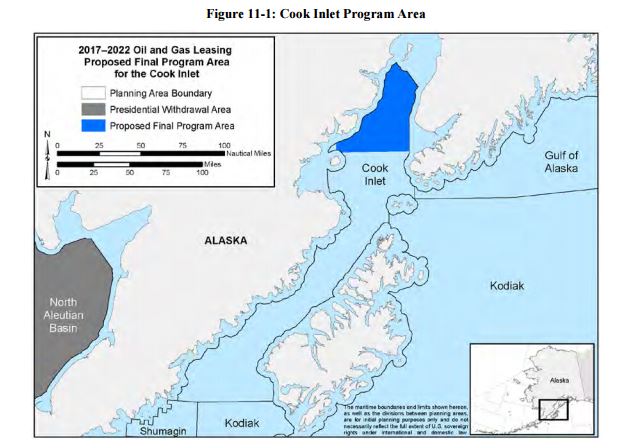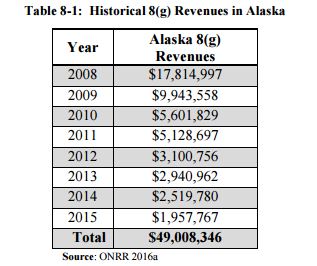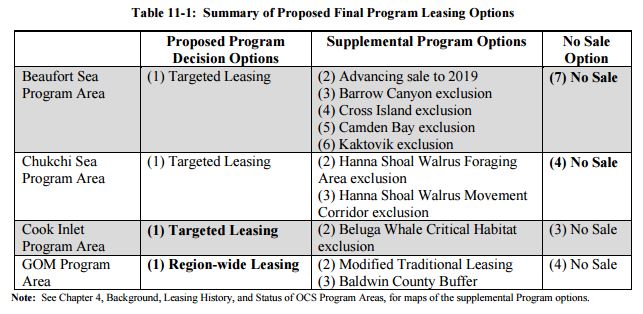Alaska reels as BOEM Announces Federal OCS Lease Schedule for 2017-2022
The U.S. government released its final list of federal lands offshore that it will open for lease sales for oil and gas development on the outer continental shelf (OCS). Excluded from the lease sales are the highly prospective areas offshore Alaska in the Arctic—the Chukchi Sea and the Beaufort Sea.
“Based on, among other factors, current market conditions, evidence of a lack of industry interest, and the recent increase in onshore oil and gas production, the Secretary (of the Interior) decided that Arctic lease sales are not needed in the 2017-2022 program to best meet the nation’s energy needs,” the Department of Interior’s Bureau of Ocean Energy Management (BOEM) said in its final document.
The proposed final program proposes a lease sale schedule of 11 lease sales, 10 in those portions of three OCS planning areas in the Gulf of Mexico that are not subject to moratorium and one in the Cook Inlet offshore Alaska.

The schedule calls for one sale in Cook Inlet offshore Alaska in 2021, where there is existing infrastructure currently supporting state leasing activities. “Unlike much of the Arctic, the Cook Inlet Program Area is close to an energy market in Anchorage, the largest energy market in Alaska. While the Beaufort has some existing infrastructure, the harsher environment and more difficult coast conflicts weigh in favor of a Cook Inlet sale,” the BOEM said.
“In total, the proposed final program makes available approximately 70% of the resources that are economically recoverable at an oil price of $40 per barrel and nearly one half of the estimated undiscovered technically recoverable OCS oil and gas resources,” the government concluded in its final lease proposal.
Strong reaction from Alaska’s Native organizations
Reaction to the news came quickly from members of Congress, energy trade associations and Native populations in Alaska who have given strong support to develop the Arctic offshore areas for the past few years.
“Today’s announcement is a body blow for the Native communities, businesses, elected officials, military experts and other Alaskans who repeatedly have pleaded with the White House to allow offshore energy development in the Arctic,” the Arctic Slope Regional Corporation (ASRC) said in a statement. The ASRC is owned by and represents the business interests of the Arctic Slope Iñupiat, who support responsible OCS development.
“Having been told that local views would take priority, they have now seen that the exact opposite is true and their wishes have been ignored in the name of legacy building,” the ASRC said. “Critical habitat designations coupled with a ban on OCS development in the Arctic will continue to endanger our communities with no regard for the future health of our people and region. This plan cripples our ability to answer the mandate from Congress under the Alaska Native Claims Settlement Act of 1971 which requires us to return benefits to our people.”
Earlier this week, ASRC announced it had purchased federal leases in and near Camden Bay, leases in the Beaufort Sea that were formally owned by Shell. “While today’s announcement from the DOI does not directly affect these leases, regulatory actions such as this negatively impact the interest in responsible development of the Arctic OCS,” the ASRC said.
Rex Allen Rock Sr., president and CEO of Arctic Slope Regional Corporation (ASRC), representing the northern-most area of Alaska, with eight villages spread out over 55-million acres, made a strong endorsement of onshore and offshore development in Alaska, and he tapped into the frustration that ASRC members have felt about the Obama administration’s failing to consult them fully in putting a decision together regarding opening areas up for leasing by oil and gas companies. However, this did not happen.
Industry reaction
“Taking American offshore energy resources off the table for the next five years will eliminate well-paying jobs and reduce the billions of dollars in much-needed revenues that go to fund schools and road repair projects in local communities. Most importantly, locking up our offshore energy supplies will cause U.S. energy prices to rise,” said Independent Petroleum Association of America (IPAA) President and CEO Barry Russell.
“This final offshore plan places more than 80% of offshore federal lands, including the already-planned Atlantic waters, the Eastern Gulf of Mexico, and even Alaska’s energy-rich waters, off limits for future development.
“It’s disappointing that this administration, with just two months left in office, has chosen to take the low, politically-motivated path and dictate the nation’s offshore program for the entirety of President-elect Trump’s four-year term,” Russell said.
Looking for a reversal from incoming administration
“It’s my hope that the new administration come January will prove to be a bit easier to work with and more beneficial for Alaska and the nation. The Arctic is open for business,” ASRC President Rock said in a speech this week.
“As a result of this decision, people across Alaska will be looking to the Trump Administration to quickly tear up the lease plan and implement an entirely new schedule, which includes the Arctic and helps secure the state’s future,” said Lucas Frances, a spokesperson for the Arctic Energy Center.

Alaska’s shrinking energy revenues
House Speaker Paul Ryan issued the following statement today: “In its final days, the Obama administration is throwing up more barriers to American energy development. This plan to exclude the resource-rich Arctic from exploration possibilities squanders our ability to harness the abundant, affordable energy sources that power our economy. Our Better Way agenda outlines a plan to unleash our energy potential and create American jobs. That’s why we will work to overturn this plan, and to open up the Arctic and other offshore areas for development.”
Summary by BOEM of comments it received from the State of Alaska during planning process
“The State of Alaska continues to urge BOEM to hold more frequent and predictable sales under an area wide approach. The State encourages BOEM to avoid delaying offshore OCS leasing in the three Alaska planning areas since sufficient information is available from years of data gathering and traditional knowledge to relieve adverse impacts. The State reiterated their opposition to a regionally tailored, targeted leasing strategy, instead of an area-wide approach. This includes opposition to the removal of Environmentally Important Areas, as the State believes there are mechanisms already in place, such as Conflict Avoidance Agreements (CAAs), that mitigate potential impacts.
“The State noted that with increased exploration of the state submerged lands in Cook Inlet and the Beaufort Sea, conducting more lease sales in the adjacent federal OCA lands of the Cook Inlet and Beaufort Sea would allow interested parties to consider exploratory programs to assess the resource prospectivity on both state and federal waters.
“States that the Chukchi Sea planning area is by far the most prospective of all Alaska OCS areas and that although the amount of exploration activity has been limited due to a number of factors, the record high lease bonuses by one leaseholder provides evidence of great potential. States that recent exploration efforts are the first in decades, and access is critical to ensuring that this work is allowed to continue and that BOEM’s analysis of the economic impact of OCS production from the Beaufort and Chukchi seas fails to adequately account for the impact that production will have on the economic value of North Slope production by allowing for substantially lower Trans-Alaska Pipeline System (TAPS) tariffs.”




